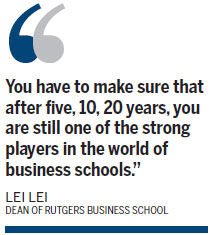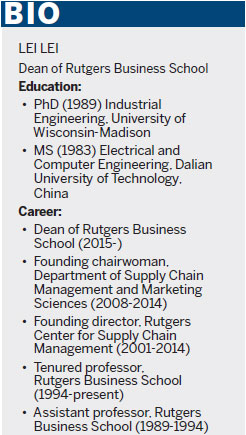
|
Professor Lei Lei, the new dean of the Rutgers Business School in New Jersey, says there is "a gap between what textbooks teach and what companies want", but she believes that for good schools, "the gap is smaller". Lu Huiquan / for China Daily |
For Professor Lei Lei, it's always been about teaching her graduate students what to do after they get out of school.
"Students are no longer content with just an MBA degree," Lei said. "They want a career, and it's not counted as a career if they are not happy with the job."
The professor in supply chain management and marketing sciences will become dean of Rutgers Business School on Jan 1.
The job comes as a time when business schools around the world are facing transformation pains. Lei will help Rutgers, the State University of New Jersey, navigate the fast-changing business environment by making the school as helpful as possible to students' career and businesses.

The number of students taking the GMAT, a test required for entrance into most US business schools, has dropped from around 266,000 in the 2008-2009 school year, to some 233,000 in 2012-2013.
It could indicate student frustration. As much-cheaper online courses get increasingly popular, and employers pay more attention to practical skills rather than just degrees, many business schools have failed to meet the challenge, wrote Forbes contributor Steve Denning.
"You have to make sure that after five, 10, 20 years, you are still one of the strong players in the world of business schools," Lei said.
In marketing, it is impossible to be strong in all aspects, but to stand out from the competition, one unique strength is enough.
Rutgers Business School, as part of a publicly funded university, cannot compete in funding with Ivy League business schools such as the University of Pennsylvania's Wharton Business School. Instead, Lei is ready to make all of the Rutgers school's 6,000-plus students shorten their preparation time and "hit the ground running" in careers the moment they graduate.
"There is a gap between what textbooks teach and what companies want," said Lei. "But for good schools, the gap is smaller."
In job interviews for new graduates, employers have also started to test students with real-world tasks, Lei said.
Lei understood the importance of hands-on skills as soon as she arrived at the school in 1989. "The clock was ticking," she said. She would either become tenured or had to leave after five years, based on her performance.
Lei started her career at Rutgers by teaching heavily quantitative courses. They are important, but boring to some students, as a lot of mathematics is involved.
"As someone who received education in China, I would have some accent," she said of her anxiety when she started teaching.
To make her classes interesting, she frequently cited daily experiences in management. Instead of reading textbooks, she would usually start with an example to illustrate the importance of her courses.
"Let's suppose you are running a hospital and hiring doctors to staff night shifts for emergency rooms," she said. "If you hire too many, they stay idle and you lose money. If you hire too few, you lose business as well because patients will have to wait and may go to other hospitals."
Lei demonstrated how she would start explaining probability theories by telling stories.
"You cannot just teach theories; you have to show the relevance to practical problem-solving," Lei said. "That will also keep students interested in the subject."
Lei won an "Outstanding Teacher Award" in 1990, one year after she started teaching, and had received five teaching excellence awards at Rutgers during her 25 years of teaching.
"She covers a lot of information at 100 mph but her teaching is straight forward," commented one student on RateMyProfessor.com, a Yelp-like website for rating professors. She got 4.8 out of 5 for "helpfulness" in class, and is one of the most popular professors at the university.
After founding the Rutgers Center for Supply Chain Management in 2001, she got four companies to be corporate sponsors. In the center, faculty members can conduct practical research as they solve problems from companies.
Students can have hands-on experiences in doing cases for companies, and the company can save the expense of hiring consultancies.

More importantly, companies can have "risk-free recruitment", as they can gain more knowledge about Rutgers students through different projects than what they could get from conventional interviews. Students also get to know employers' requirements.
Lei expanded her model with the Department of Supply Chain and Marketing Sciences as the founding chairwoman in 2008.
Now, her department is in partnership with 129 companies, including Johnson & Johnson, whose world headquarters are in New Brunswick, New Jersey, the same city where Rutgers' main campus is based.
Rutgers Business School's career service was ranked seventh in the US by US News & World Report. Lei's department has had a 100 percent internship placement since its founding.
As for her new position as dean, she initially didn't apply for it and preferred to stay in her "comfort zone" with one department, one research center, dozens of faculty members and hundreds of students.
However, her colleagues encouraged her to join the competition with candidates from all over the world. They believed that if she could build a nice department from scratch, she would be able to do the same for the entire business school.
Rutgers University ranks 11th out of 40 in the supply chain undergraduate-program rankings by Gartner, an information research and advisory company; and No 11 out of 35 in Gartner's supply chain graduate program ranking.
After her inauguration as dean, she will help all six departments at the business school partner with businesses.
"I can have one department with 129 partnerships, and now there are six departments.," Lei said. "Even by a conservative estimate, it could be 600. By that time, Rutgers would be No 1 in terms of industry partnership."
Lei is having an impact outside the university. She has found 15 companies to help 15 high schools in Newark, New Jersey, one for each. Rutgers professors will work on a survey on most urgently needed skills.
Selected high school students who will not go to college will receive training in the skill and then go to a job fair.
"We will equip 300 students every year with the No 1 [needed] skill, and there are hundreds of jobs required here every year," said Lei. "We are not just a business school. We also want to deliver our own social impact."
Lu Huiquan in New York contributed to this report.